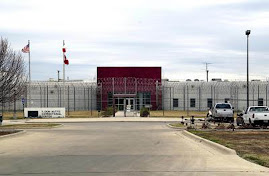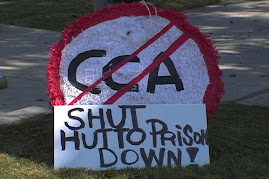immigrant detention centers, such as the T. Don Hutto Center in Taylor, in 2007 alone. According to ICE, the purpose of immigrant detention centers is to "detain and remove criminal and other deportable aliens ... in part of the strategy to deter illegal immigration and protect public safety."
Despite what ICE ostensibly promotes, these for-profit detention centers are not achieving their intended
goals, as they do not create a disincentive for coming to the U.S. The risk of crossing over illegally is a
small price to pay for the safety and high labor demand on the other side of the border. Additionally,
undocumented immigrants are often hesitant to report crimes to authorities due to the fear of being detained,
in which case detention centers may be hindering communities more than helping them.
Privatized detention centers are going up all over the United States as a way to deal with the growing number of undocumented immigrants. As a result, not only are we detaining immigrants in our country, but because of the move toward privatization, these facilities are able to make a profit from these prisoners. The industry leader, Corrections Corporation of America, has seen its stock price rise to as much as $22 a share, and in 2006 its revenue was $1.3 billion with profits of $105 million. According to industry experts, in order to make a profit these companies not only need to ensure that more prisons are built, but also need to keep them filled to an estimated 90-to 95-percent capacity rate. These for-profit detention centers demand immigrants' bodies and labor, and it is disturbing to think about how this demand will be met.
The immigrants sent to detention centers are often non-criminals who have had households in the U.S. for a number of years. Detained persons are locked in overcrowded facilities with often deplorable and unlivable conditions, such as a lack of access to sufficient food, clothing, medical care or basic necessities such as functioning showers and toilets.
Our nation is caught in a debate over the extent to which we suffer from the presence of undocumented workers in our country. The truth is that the U.S. has helped create this situation, relying on the immigrants' cheap labor to fill low-wage, low-skill jobs. How ungrateful a nation are we to criminalize people who have not committed crimes but have in many ways helped fuel the U.S. economy?
By privatizing detention facilities we have moved into an arena of not just holding these individuals in subpar facilities to prevent their disappearance in our country, which is the proposed reason for why these facilities are even necessary, but to exploit humans and use them for profit.The labor practices used in these prison companies to make a profit would be illegal under any other circumstance; however, we are not only allowing it but increasing our investment in these privatized facilities. While inmates in any prison facility make little money for their work, illegal immigrants are treated far worse. The Department of Homeland Security guidelines state that any non-citizen can make no more than $1 a day for the countless labor tasks they are forced to perform while imprisoned. This policy enables these companies to have maintenance crews, cleaners, cooks and groundskeepers at almost no cost. In addition to nearly no-cost labor, these detention centers maximize profits with the deplorable conditions they force these immigrants to live in. By only spending about $28 per inmate, they can make a profit of over $50 per inmate for every day they detain them.
As a result, there is now a profit motive behind arresting and detaining immigrants. With more than 7 million illegal immigrants in the U.S., it is unrealistic that deportation would ever be a feasible solution to the problem. But maybe that's just the plan for-profit detention centers have in mind: a constant inflow of money at the cost of a human life, even that of a child. It is imperative that we as a society take a stand against the human rights violations that are occurring everyday in detention centers throughout our country. Next Thursday, May 1, provides an excellent opportunity to become involved in this issue by joining the march and rally for immigrant rights being held on the steps of the Capitol."
The authors are graduate students in social work at the University of Texas.








